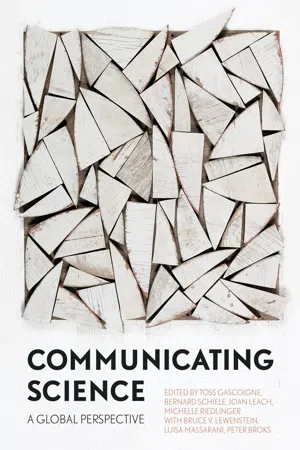
Communicating Science
A Global Perspective
- 994 pages
- English
- PDF
- Available on iOS & Android
Communicating Science
A Global Perspective
About this book
Modern science communication has emerged in the twentieth century as a field of study, a body of practice and a profession—and it is a practice with deep historical roots. We have seen the birth of interactive science centres, the first university actions in teaching and conducting research, and a sharp growth in employment of science communicators.
This collection charts the emergence of modern science communication across the world. This is the first volume to map investment around the globe in science centres, university courses and research, publications and conferences as well as tell the national stories of science communication.
How did it all begin? How has development varied from one country to another? What motivated governments, institutions and people to see science communication as an answer to questions of the social place of science?
Communicating Science describes the pathways followed by 39 different countries. All continents and many cultures are represented. For some countries, this is the first time that their science communication story has been told.
Tools to learn more effectively

Saving Books

Keyword Search

Annotating Text

Listen to it instead
Information
Table of contents
- Preface
- Acknowledgements
- 1. Introduction: A global trend, an emerging field, a multiplicity of understandings: Science communication in 39 countries
- 2. The Timelines: A broad‑brush analysis
- 3. Africa: Health communication in selected African states from colonial times
- 4. Aotearoa New Zealand: Participatory science and bicultural knowledge communication
- 5. Argentina: Contexts, agents and practices in science communication
- 6. Australia: The five stages of development of science communication
- 7. Brazil: History, significant breakthroughs and present challenges in science communication
- 8. Canada: One country, two cultures: Two routes to science communication
- 9. China: Science popularisation on the road forever
- 10. Colombia: Stories in the history of science communication
- 11. Denmark, Norway and Sweden: Share, make useful and critically discuss: Science communication
- 12. Estonia: Science communication in a post-Soviet country
- 13. France: ‘The Republic needs scholars!’ A rapid history of making science public in 20th-century France
- 14. Germany: Continuity and change marked by a turbulent history
- 15. Ghana: When individuals refuse to let science communication die
- 16. India: Tracing science communication in independent India
- 17. Iran: From the ancient world of Elam to modern science communication
- 18. Ireland: Science in a land of storytellers
- 19. Israel: Developed Science, developing Science Communication
- 20. Italy: The long and winding path of science communication
- 21. Jamaica: Science communication in the land of wood and water
- 22. Japan: Western science and Japanese culture
- 23. Malaysia: Science communication in a pluralistic society
- 24. Mexico: From simple and centralised to expansion, diversity and complexity
- 25. The Netherlands: From the first science information officers to the Dutch Research Agenda
- 26. Nigeria: Battling the odds: Science communication in an African state
- 27. Pakistan: Changing landscape of science communication
- 28. Philippines: From science then communication, to science communication
- 29. Portugal: The late bloom of (modern) science communication
- 30. Russia: Russian pendulum: From glorious science propaganda to modest public engagement initiatives
- 31. Singapore: An evolving and increasingly complex relationship
- 32. South Africa: Science communication throughout turbulent times
- 33. South Korea: A different exemplar
- 34. Spain: Evolution and professionalisation of science communication
- 35. Taiwan: From nationalising science to democratising science
- 36. Thailand: From temples and palaces to modern science communication
- 37. Turkey: From the Ottoman Empire to the Republic
- 38. Uganda: Cultural values and modern media as drivers of science communication
- 39. United Kingdom: The developing relationship between science and society
- 40. United States of America: Science communication in the USA: It’s complicated
Frequently asked questions
- Essential is ideal for learners and professionals who enjoy exploring a wide range of subjects. Access the Essential Library with 800,000+ trusted titles and best-sellers across business, personal growth, and the humanities. Includes unlimited reading time and Standard Read Aloud voice.
- Complete: Perfect for advanced learners and researchers needing full, unrestricted access. Unlock 1.4M+ books across hundreds of subjects, including academic and specialized titles. The Complete Plan also includes advanced features like Premium Read Aloud and Research Assistant.
Please note we cannot support devices running on iOS 13 and Android 7 or earlier. Learn more about using the app